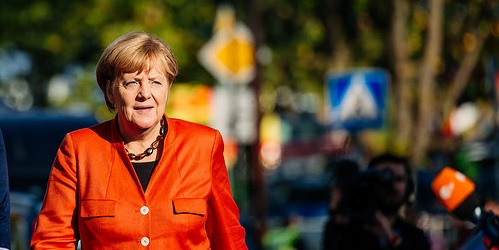Merkel enters Brexit fray
April 2, 2019 | Expert Insights

Angela Merkel is expected to fly to Ireland to discuss with PM Varadkar about preparations should a no-deal Brexit occur. Chancellor Merkel’s support is critical to PM May’s plans should she seek another Brexit extension.
Background
On June 23rd, 2016, Britain narrowly voted to leave the European Union (EU), stunning Europe and the world. The EU employs a set of policies for its 28-member states that aim to ensure the free movement of people, goods and trade among other services. Britain is deeply intertwined with the inner-workings of the EU, especially with regard to trade.
Prime Minister Theresa May’s leadership in the negotiations has been heavily criticised. She has been unable to form a consensus within the Parliament, or even in her own party, for the course of Brexit. Her “directionless” leadership has not convinced most of her peers in Westminster and she was challenged by a no-confidence motion in early December 2018, which she narrowly won. Despite the PM’s efforts, the British parliament is yet to accept the proposed Brexit agreement. Irrespective of whether they had arrived at a deal or not, the UK was officially set to leave on March 29, 2019, although the EU has currently extended the hard deadline till April 12, 2019.
Diplomats in Brussels and London have already begun a blame-game in aid of securing public perception against the other. From the moment Britain triggered the two-year Article 50 clock on its departure in March 2017, the “cliff-edge” threat has been used by Brussels negotiators, both to exert pressure and kick-start national planning for the worst. Two of the largest sticking points in the negotiations in relation to a no-deal Brexit — the Northern Ireland border and the hole left in the EU budget from missing UK contributions — have still largely been sidestepped in public EU preparations.
Analysis
In upcoming weeks German Chancellor, Angela Merkel will undertake a significant intervention in the Brexit process aimed at securing the EU’s position in the immediate aftermath of a potential no-deal Brexit. Scheduled to meet Irish PM Leo Varadkar in Dublin, Chancellor Merkel will demand a plan to ensure the protection of Ireland’s border with the UK. The move comes as relations between the UK and EU have hit a new low after repeated rejections of May’s Brexit deals in parliament.
PM May is likely to make a fourth attempt to secure Parliament’s approval for her deal. Her cabinet has remained split on the issue, with some calling for her to take the UK out of the EU with or without a deal come April 12, while others have threatened to quit should she adopt such a policy. Another course of action for PM May is to call a general election in the hopes that it will break the current deadlock over Brexit.
However, for EU leaders, dealing with all potential outcomes is of primordial importance. One of the most pertinent issues that is gaining increasing attention is the lack of preparation to secure the only physical land boundary between the EU and the UK; Ireland. Chancellor Merkel represents one of the few governments that are willing to give more time to Britain should no deal materialise before April 12. If PM May calls a snap election, Britain will most likely need such an extension. However, this may be a tough uphill battle as such an extension would require unanimous approval among all EU states, and several leaders including French President Emmanuel Macron have argued against such a move. For EU leaders, limiting damage to the rest of Europe is now the priority of the union. The EU has repeatedly proposed a “backstop” arrangement which is intended to help prevent the need for a physical boundary in Ireland by keeping the UK in a customs union until a better solution is found, which has been repeatedly rejected by parliament.
Such a physical boundary brings back painful memories of decades of violence between Northern Ireland and the Republic of Ireland. This hard border is simply not an option for PM Varadkar’s government. EU officials are said to be looking into whether checks on the flow of goods can happen as far away from the border as possible.
Assessment
Our assessment is that Chancellor Merkel is likely to take a more central role in UK-EU negotiations in upcoming weeks as the crisis reaches a fever-pitch. We believe that the Ireland question needs urgent addressing, in order to negate any possibility of physical violence. We also believe that in order for PM May to secure a Brexit extension longer than April 12, she will need to support of Angela Merkel to help sway 26 other EU leaders.
Image Courtesy: "Angela Merkel" (CC BY 2.0) by EU2017EE
Read more:








Comments